SJI works to identify and provide solutions to address barriers that low-income and low-skill individuals face in preparing for, accessing and completing community college programs. We provide the research, space and leadership needed for multiple stakeholders to come together to identify and pursue opportunities to collectively develop and share tools and best practices to help many more individuals successfully navigate through college and to a better career.
Resources
Certificate Programs and Their Economic Value: A Look at King County Postsecondary Institutions, September 2013
Seattle Jobs Initiative is pleased to present our latest labor market research, Certificate Programs and Their Economic Value: A Look at King County Postsecondary Institutions. SJI works with local community colleges to creatively align our education and training programs with viable career opportunities. Many sub-baccalaureate certificates, of varying lengths and fields of study, have been awarded through these programs to better assist participants on their journey to living-wage careers.Through this research, SJI seeks to inform workforce development providers about the varying characteristics of certificates in King County. Namely, we discuss the number of certificates awarded and how that has changed in the last twenty years as well as the demographic makeup of certificate holders. Additionally, we look at the characteristics of short- and long-term certificates and the outcomes they produce. And lastly, we identify education and training programs in King County which provide students with opportunities to attain certificates leading to a viable career.
Supporting Developmental Education Reform: Washington Works to Increase Student Success, March 2011
In this policy brief released by SJI in Spring 2011, highlights the challenges that community colleges face to help under-prepared students gain the fundamental academic skills they need to succeed in college. As workforce agencies throughout the country implement programs to help individuals earn long-term certificates and degrees, it is vitally important that the agencies, and their students, understand the developmental education system that the students will enter. This brief looks at the structure of current developmental education programs in Washington State, and at the potential impact of those programs on students seeking professional/technical credentials. It outlines efforts that Washington’s community colleges are making to improve developmental education and ties these efforts to national policy recommendations and research on innovations to increase student success — and emphasizes the critical importance that implementation of national policy recommendations for sharing data on developmental practices and outcomes will have to the success of workforce college attainment programs.
A Survey of U.S. and Washington State Postsecondary Attainment Data, August 2009
SJI completed a survey on the rates of postsecondary attainment in the United States and in Washington State among different demographic groups, with a focus on community college attainment. The survey provides some additional data on the association between wages and attainment level in Washington State.
Charting a Path: An Exploration of the Statewide Career Pathway Efforts in Arkansas, Kentucky, Oregon, Washington and Wisconsin, June 2009
Supported by the Working Poor Families Project as well as the City of Seattle Office of Economic Development, this report examines the role the state can play in instituting the career pathways framework, which can be a key strategy for linking low-income, low-skilled adults to education and training that leads to family supporting jobs. The report should serve as a resource for other states that are interested in utilizing a career pathways framework.
College Attainment Tools
SJI is working to increase the rates of college attainment as a critical part of our mission to help low-income individuals to secure living-wage jobs while also meeting the demands of the local economy for skilled workers. We strive to provide leadership to the community in a ground-up, collaborative approach to identify and develop needed tools that can help address the challenges these individuals face in preparing for, accessing and completing college programs.
Recently developed tools are specifically designed to help community-based practitioners to succeed in their work within the emerging field of college navigation.
Overview of SJI’s College Attainment Tools & Objectives, January 2012
Dance Steps
SJI’s Dance Steps Brochure is a guide to the basic steps in becoming an enrolled student at a community college. The Community College Inserts highlight three local community colleges and show where to go to complete each enrollment step on that particular campus.
The printed Dance Steps Brochure and Inserts are available for your organization! Please contact SJI at (206) 628-6975 to request a supply of these materials for your use.
PDF Samples:
Dance Steps Brochure, October 2009
Insert: North Seattle Community College, May 2012
Insert: Shoreline Community College, October 2009
Insert: South Seattle Community College, Updated May 2012
Insert: Highline Community College, October 2012
College Program Matrix
The Community College Program “Matrix” is an Excel-based tool intended to help college navigators and other community-based organization staff guide students through the local community college system – allowing users to quickly and easily learn more about, compare, select, and connect to programs at local colleges within four key local industry sectors: Business Information Technology, Healthcare, Manufacturing, and Transportation.
Community College Program Matrix Tool, January 2012 (Excel, 43KB)
User Guide: Community College Program Matrix Tool, January 2012 (PDF, 171 KB)
PDF version: Community College Program Matrix Tool (note: only the Excel version of the Matrix tool can be sorted/manipulated), January 2012
The ABC’s of College Navigation
This tool puts important information and resources at the fingertips of college navigators and others supporting low-income individuals, providing comprehensive information organized in sections that reflect the typical steps a college navigator would take to help an individual become a successful community college student.
The ABC’s of College Navigation Guide, January 2012
